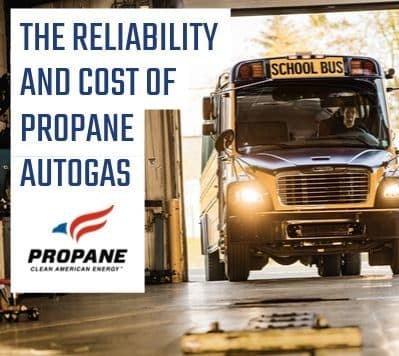The Reliability and Cost of Propane Autogas
Fleet managers, maintenance technicians, and drivers across the United States are well aware of seasonal headaches that come with using diesel fuel systems when the temperatures drop. Propane autogas can relieve the pain associated with dealing with diesel in the winter, including increased costs, increased maintenance and even ice-cold cabs. Switching to propane fuel can alleviate cold weather-related problems faced by diesel fuel engines during the fall and winter.
The costs of starting a cold diesel engine, or keeping it warm, can add up quickly with employee overtime, increased electrical costs for block heaters, and expensive anti-gelling fluids. In fact, the Metropolitan School District of Warren Township in Indianapolis, Indiana, estimates it spent $40,820 during the 2015-2016 school year for cold startups alone. Now, the district has 11 propane autogas school buses, which don’t require block heaters to warm up engines, additional fluids to prevent fuel from gelling up or driver time spent running the engines before use.
Diesel vehicles have another hidden cost during the winter – downtime for repairs. Unlike older diesel vehicles, modern diesel engines require parts and filters to reduce pollutants. The excessive idling necessary to keep the vehicles operational during cold weather has proven to damage these parts, including injectors, EGR valves and coolers, turbochargers and DPFs, all of which contribute to increased downtime and maintenance expenses. Additionally, longer idling consumes fuel faster.
Propane autogas engines provide superior performance, crank reliably regardless of the temperature, and are not adversely affected by extended idling periods. The cost of propane fuel is also consistently less than diesel and gasoline. Fleets report saving between 30 to 50 percent on fuel after converting to propane.
Because propane autogas vehicles start up immediately, heat is also supplied to cabs much faster than in a diesel vehicle, eliminating the expense of auxiliary heaters. This allows drivers to focus on the road and the day ahead, rather than regretting not bringing a heavier coat. Drivers and students have a more comfortable ride. This can contribute to increased driver retention and greater overall job satisfaction with drivers.
School buses powered by propane also provide a healthier environment for drivers and students, without having to breathe harmful diesel emissions. Diesel emissions are known aggravators of asthma and other breathing issues and have been identified as carcinogenic. There’s a better way. Propane reduces NOx and greenhouse gas emissions compared with diesel and gasoline, resulting in safer and healthier communities.
Lastly, propane buses operate noticeably quieter than diesel models, allowing drivers to better focus on their passengers and the road. Standard safety features designed into propane bus fuel systems provide added peace of mind for everyone.
Learn more about how school bus fleets can take advantage of propane.
